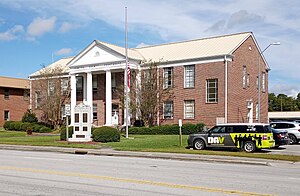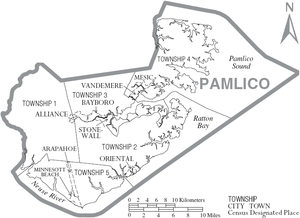Pamlico County, North Carolina
Pamlico County | |
|---|---|
 Pamlico County Courthouse in Bayboro | |
 Location within the U.S. state of North Carolina | |
 North Carolina's location within the U.S. | |
| Coordinates: 35°09′N 76°40′W / 35.15°N 76.67°W | |
| Country | |
| State | |
| Founded | 1872 |
| Named for | Pamlico Sound |
| Seat | Bayboro |
| Largest community | Bayboro |
| Area | |
• Total | 561.63 sq mi (1,454.6 km2) |
| • Land | 336.52 sq mi (871.6 km2) |
| • Water | 225.11 sq mi (583.0 km2) 40.08% |
| Population (2020) | |
• Total | 12,276 |
• Estimate (2023) | 12,423 |
| • Density | 36.45/sq mi (14.07/km2) |
| Time zone | UTC−5 (Eastern) |
| • Summer (DST) | UTC−4 (EDT) |
| Congressional district | 3rd |
| Website | www |
Pamlico County (/ˈpæmlɪkoʊ/ PAM-lik-oh) is a county located in the U.S. state of North Carolina. As of the 2020 census, the population was 12,276.[1] Its county seat is Bayboro.[2]
Pamlico County is part of the New Bern, NC Micropolitan Statistical Area.
History
[edit]The county was formed in 1872 from parts of Beaufort and Craven counties. It was named for Pamlico Sound, which adjoins it. Vernacular usage in the area, especially in Craven County, refers to Pamlico County as being "down in the county." Prior to 1872, it was a part of Craven County and has a very low elevation. Most of the county, according to FRIS, North Carolina Flood Risk Information System, is subject to flooding in storm surges. After it was separated from Craven, the old nickname survives. Pamlico County remains rural in character and flavor, although the last decade has brought a good deal of residential development, largely the result of northern retirees and investors attracted to the many miles of waterfront property.
The county is anchored on the east by the town of Oriental, a popular waystation for boaters traveling the Intracoastal Waterway, and by unincorporated Lowland. New Bern across the county line in Craven County to the west, is the primary trade area for Pamlico County.[3] The unincorporated community of Olympia is in the western portion of the county.
Geography
[edit]
According to the U.S. Census Bureau, the county has a total area of 561.63 square miles (1,454.6 km2), of which 336.52 square miles (871.6 km2) is land and 225.11 square miles (583.0 km2) (40.08%) is water.[4]
State and local protected areas
[edit]Major water bodies
[edit]Adjacent counties
[edit]- Beaufort County – north
- Hyde County – northeast
- Carteret County – southeast
- Craven County – southwest
Major highways
[edit]Major infrastructure
[edit]- Cherry Branch–Minnesott Beach Ferry (to Craven County)
Demographics
[edit]| Census | Pop. | Note | %± |
|---|---|---|---|
| 1880 | 6,323 | — | |
| 1890 | 7,146 | 13.0% | |
| 1900 | 8,045 | 12.6% | |
| 1910 | 9,966 | 23.9% | |
| 1920 | 9,060 | −9.1% | |
| 1930 | 9,299 | 2.6% | |
| 1940 | 9,706 | 4.4% | |
| 1950 | 9,993 | 3.0% | |
| 1960 | 9,850 | −1.4% | |
| 1970 | 9,467 | −3.9% | |
| 1980 | 10,398 | 9.8% | |
| 1990 | 11,372 | 9.4% | |
| 2000 | 12,934 | 13.7% | |
| 2010 | 13,144 | 1.6% | |
| 2020 | 12,276 | −6.6% | |
| 2023 (est.) | 12,423 | [1] | 1.2% |
| U.S. Decennial Census[6] 1790–1960[7] 1900–1990[8] 1990–2000[9] 2010[10] 2020[1] | |||
Census reports show a marked drop of nearly 10 percent in county population from 1910 to 1920, the period of the Great Migration of African Americans from rural areas of the South to northern and midwestern industrial cities offering more economic and social opportunities. Workers were recruited by northern industries, including the Pennsylvania Railroad, which was rapidly expanding at the time.
2020 census
[edit]| Race | Number | Percentage |
|---|---|---|
| White (non-Hispanic) | 9,104 | 74.16% |
| Black or African American (non-Hispanic) | 2,055 | 16.74% |
| Native American | 58 | 0.47% |
| Asian | 50 | 0.41% |
| Pacific Islander | 5 | 0.04% |
| Other/Mixed | 508 | 4.14% |
| Hispanic or Latino | 496 | 4.04% |
As of the 2020 census, there were 12,276 people, 5,416 households, and 3,589 families residing in the county.
2000 census
[edit]At the 2000 census, there were 12,934 people, 5,178 households, and 3,717 families residing in the county. The population density was 38 people per square mile (15 people/km2). There were 6,781 housing units at an average density of 20 units per square mile (7.7 units/km2). The racial makeup of the county was 73.17% White, 24.57% Black or African American, 0.53% Native American, 0.38% Asian, 0.02% Pacific Islander, 0.59% from other races, and 0.74% from two or more races. 1.32% of the population were Hispanic or Latino of any race.
There were 5,178 households, out of which 25.20% had children under the age of 18 living with them, 56.60% were married couples living together, 11.50% had a female householder with no husband present, and 28.20% were non-families. 25.00% of all households were made up of individuals, and 12.10% had someone living alone who was 65 years of age or older. The average household size was 2.38 and the average family size was 2.81.
In the county, the population was spread out, with 21.10% under the age of 18, 6.40% from 18 to 24, 25.80% from 25 to 44, 28.00% from 45 to 64, and 18.80% who were 65 years of age or older. The median age was 43 years. For every 100 females there were 101.40 males. For every 100 females age 18 and over, there were 99.80 males.
The median income for a household in the county was $34,084, and the median income for a family was $41,659. Males had a median income of $31,806 versus $21,344 for females. The per capita income for the county was $18,005. About 11.80% of families and 15.30% of the population were below the poverty line, including 24.20% of those under age 18 and 13.40% of those age 65 or over.
Government and politics
[edit]The county is a member of the regional Eastern Carolina Council of Governments.
Pamlico County is governed by an elected, seven-member Board of Commissioners.[12]
| Year | Republican | Democratic | Third party(ies) | |||
|---|---|---|---|---|---|---|
| No. | % | No. | % | No. | % | |
| 2024 | 5,229 | 65.56% | 2,676 | 33.55% | 71 | 0.89% |
| 2020 | 4,849 | 63.54% | 2,713 | 35.55% | 69 | 0.90% |
| 2016 | 4,258 | 61.98% | 2,448 | 35.63% | 164 | 2.39% |
| 2012 | 4,051 | 59.91% | 2,647 | 39.15% | 64 | 0.95% |
| 2008 | 3,823 | 56.96% | 2,838 | 42.28% | 51 | 0.76% |
| 2004 | 3,679 | 60.93% | 2,335 | 38.67% | 24 | 0.40% |
| 2000 | 2,999 | 57.21% | 2,188 | 41.74% | 55 | 1.05% |
| 1996 | 2,270 | 47.39% | 2,204 | 46.01% | 316 | 6.60% |
| 1992 | 1,929 | 38.77% | 2,229 | 44.80% | 817 | 16.42% |
| 1988 | 2,297 | 50.98% | 2,188 | 48.56% | 21 | 0.47% |
| 1984 | 2,554 | 54.14% | 2,152 | 45.62% | 11 | 0.23% |
| 1980 | 1,504 | 39.55% | 2,224 | 58.48% | 75 | 1.97% |
| 1976 | 1,068 | 33.28% | 2,113 | 65.85% | 28 | 0.87% |
| 1972 | 1,847 | 66.11% | 919 | 32.89% | 28 | 1.00% |
| 1968 | 745 | 21.46% | 1,280 | 36.87% | 1,447 | 41.68% |
| 1964 | 1,036 | 35.72% | 1,864 | 64.28% | 0 | 0.00% |
| 1960 | 1,061 | 38.47% | 1,697 | 61.53% | 0 | 0.00% |
| 1956 | 954 | 40.94% | 1,376 | 59.06% | 0 | 0.00% |
| 1952 | 903 | 38.74% | 1,428 | 61.26% | 0 | 0.00% |
| 1948 | 685 | 31.18% | 1,370 | 62.36% | 142 | 6.46% |
| 1944 | 719 | 35.70% | 1,295 | 64.30% | 0 | 0.00% |
| 1940 | 730 | 33.52% | 1,448 | 66.48% | 0 | 0.00% |
| 1936 | 860 | 34.58% | 1,627 | 65.42% | 0 | 0.00% |
| 1932 | 665 | 29.35% | 1,526 | 67.34% | 75 | 3.31% |
| 1928 | 1,099 | 55.59% | 878 | 44.41% | 0 | 0.00% |
| 1924 | 459 | 36.52% | 798 | 63.48% | 0 | 0.00% |
| 1920 | 1,008 | 43.94% | 1,286 | 56.06% | 0 | 0.00% |
| 1916 | 527 | 41.99% | 710 | 56.57% | 18 | 1.43% |
| 1912 | 74 | 6.62% | 694 | 62.13% | 349 | 31.24% |
Communities
[edit]
Towns
[edit]- Alliance
- Arapahoe
- Bayboro (county seat and largest community)
- Grantsboro
- Mesic
- Minnesott Beach
- Oriental
- Stonewall
- Vandemere
Census-designated place
[edit]Unincorporated communities
[edit]- Florence
- Janerio
- Lowland
- Maribel
- Merritt
- Olympia
- Reelsboro
- Whortonsville
Townships
[edit]By the requirements of the North Carolina Constitution of 1868, the county was divided into 5 townships, which are only numbered:
- Township 1
- Township 2
- Township 3
- Township 4
- Township 5
Notable people
[edit]- David B. Mintz, Methodist circuit rider minister for Pamlico in 1804
See also
[edit]- List of counties in North Carolina
- National Register of Historic Places listings in Pamlico County, North Carolina
References
[edit]- ^ a b c "QuickFacts: Pamlico County, North Carolina". United States Census Bureau. Retrieved March 22, 2024.
- ^ "Find a County". National Association of Counties. Retrieved June 7, 2011.
- ^ "PAMLICO COUNTY". politicsnc.com. February 27, 2013. Retrieved November 6, 2022.
- ^ "2020 County Gazetteer Files – North Carolina". United States Census Bureau. August 23, 2022. Retrieved September 9, 2023.
- ^ a b c "NCWRC Game Lands". www.ncpaws.org. Retrieved March 30, 2023.
- ^ "U.S. Decennial Census". United States Census Bureau. Retrieved January 18, 2015.
- ^ "Historical Census Browser". University of Virginia Library. Retrieved January 18, 2015.
- ^ Forstall, Richard L., ed. (March 27, 1995). "Population of Counties by Decennial Census: 1900 to 1990". United States Census Bureau. Retrieved January 18, 2015.
- ^ "Census 2000 PHC-T-4. Ranking Tables for Counties: 1990 and 2000" (PDF). United States Census Bureau. April 2, 2001. Archived (PDF) from the original on March 27, 2010. Retrieved January 18, 2015.
- ^ "State & County QuickFacts". United States Census Bureau. Archived from the original on June 7, 2011. Retrieved October 29, 2013.
- ^ "Explore Census Data". data.census.gov. Retrieved December 23, 2021.
- ^ "Pamlico County - Commissioner Profiles". September 28, 2011. Archived from the original on September 28, 2011. Retrieved December 16, 2022.
- ^ Leip, David. "Dave Leip's Atlas of U.S. Presidential Elections". uselectionatlas.org. Retrieved March 17, 2018.
External links
[edit] Geographic data related to Pamlico County, North Carolina at OpenStreetMap
Geographic data related to Pamlico County, North Carolina at OpenStreetMap- Official website
- Pamlico County Chamber of Commerce
- NCGenWeb Pamlico County, genealogy resources for the county
- The County Compass, weekly newspaper serving Pamlico County
- The Pamlico News, weekly newspaper serving Pamlico County



